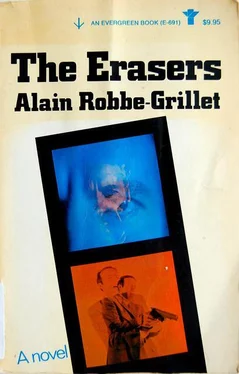Alain Robbe-Grillet - The Erasers
Здесь есть возможность читать онлайн «Alain Robbe-Grillet - The Erasers» весь текст электронной книги совершенно бесплатно (целиком полную версию без сокращений). В некоторых случаях можно слушать аудио, скачать через торрент в формате fb2 и присутствует краткое содержание. Жанр: Криминальный детектив, на английском языке. Описание произведения, (предисловие) а так же отзывы посетителей доступны на портале библиотеки ЛибКат.
- Название:The Erasers
- Автор:
- Жанр:
- Год:неизвестен
- ISBN:нет данных
- Рейтинг книги:4 / 5. Голосов: 1
-
Избранное:Добавить в избранное
- Отзывы:
-
Ваша оценка:
- 80
- 1
- 2
- 3
- 4
- 5
The Erasers: краткое содержание, описание и аннотация
Предлагаем к чтению аннотацию, описание, краткое содержание или предисловие (зависит от того, что написал сам автор книги «The Erasers»). Если вы не нашли необходимую информацию о книге — напишите в комментариях, мы постараемся отыскать её.
The Erasers — читать онлайн бесплатно полную книгу (весь текст) целиком
Ниже представлен текст книги, разбитый по страницам. Система сохранения места последней прочитанной страницы, позволяет с удобством читать онлайн бесплатно книгу «The Erasers», без необходимости каждый раз заново искать на чём Вы остановились. Поставьте закладку, и сможете в любой момент перейти на страницу, на которой закончили чтение.
Интервал:
Закладка:
But the chief does not seem convinced. He growls between his teeth, with an expression of suspicion and doubt:
“… the truth…the truth…the truth…”
5
Madame Jean glances cautiously toward the post office. Everything is calm along the parkway.
But everything seemed just as calm before, and yet some thing happened, here, fifty yards away, at the corner of the Rue Jonas. It had already begun in September-otherwise the commissioner would not have sent for her this afternoon. Probably she was taking part in their shady deals without even knowing it. In any case, she didn’t get anything out of it.
She certainly gave the man letters, without thinking twice about it: she had enough trouble checking the numbers on the cards, without examining the faces of the people who handed them to her. He might even have come often: the little Dexter girl obviously knew him well. He said he wasn’t the one, of course, and Madame Jean wasn’t going to say anything different! They’re big enough to get out of it by themselves. Yet she had proof of the fact that he really was the one: if he was so eager to find another post office this morning, it was because he couldn’t go back to that one, where he would have been recognized right away.
When she saw him again, after lunch, he was so tired that he had fallen asleep over his table. What had he been doing all morning long? Something else besides sending a telegram, that was sure. And why was he loitering around here again?
A doctor, Emilie said-maybe. He’s well dressed; he looks important. Madame Jean tries to imagine Wallas with the heavy glasses described by the old maid; actually it makes him into quite a likely doctor. Which obviously does not keep him from being a criminal.
“There are some funny doctors around here, you know.” That’s the truth. And who don’t know much: the epidemic proved that. But this one’s sly. He’s even managed to put the commissioner in his pocket: a little more and he’d have been running the investigation! He sounded so cocky when he answered the little Dexter girl that the poor thing didn’t dare say mother word. They don’t have much chance of finding the guilty man now.
Madame Jean thinks about this strange turn of events inwhich the guilty man himself takes charge of the investigation. Since she cannot make any headway in so confusing a supposition, she deliberately turns her eyes away-and begins thinking about something else.
6
A tremendous voice fills the hall. Projected by invisible loudspeakers, it bounces back and forth against the walls covered with signs and advertisements, which amplify it still more, multiply it, reflect it, baffle it with a whole series of more or less conflicting echoes and resonances, in which the original message is lost-transformed into a gigantic oracle, magnificent, indecipherable, and terrifying.
As suddenly as it had begun, the uproar stops, again making way for the confused murmur of the crowd.
People are hurrying in all directions. They must have guessed-or imagined they guessed-the meaning of the announcement, for the agitation has redoubled. Among the curtailed movements-each of which affects only an extremely small section of the hall-between a timetable and a ticket window from an information booth to a newsstand-or even within less defined areas, animated here and there with vague, hesitant discontinuous, aleatory movements-in the middle of this swarming mass occasionally interrupted, up to now, by some less episodic trajectory, distinct currents now appear; in one corner a single file has started across the entire hall in a decisive diagonal; farther on, scattered impulses unite in a series of calls and quick steps whose impetus clears a wide passage until it comes to a halt against one of the exits; a woman slaps a little boy, a gentleman feverishly searches through his many pockets for the ticket he has just bought; on all sides people are shouting, dragging suitcases, hurrying.
Doctor Juard has neither suitcase nor ticket. He is not interested in the train schedules. He has not understood what the loudspeaker has said. Neither his movements nor his general attitude have undergone any important change since a moment ago: he takes five steps along the wall, between the snack bar and the telephones, turns around, takes two steps in the opposite direction, glances at his watch, looks up at the big clock, continues straight ahead to the first telephone booth, turns back, stops, stands still for a few seconds…and then starts slowly toward the snack bar. He is waiting for someone who has not come.
Again the warning buzzing can be heard and suddenly the whole hall echoes to the rumbling of the divine voice. It is a clear and strong voice; one must listen to it carefully to realize that what it is saying is incomprehensible.
This last message is shorter than the previous one. It is followed by no appreciable change among the crowd. Doctor Juard, who has stood stock still, begins walking toward the row of telephone booths again.
But these words that do not seem to have achieved their purpose leave him with a vague sensation of discomfort. If the announcement was not for the travelers, perhaps it concerned him: “Doctor Juard is wanted on the telephone.” He did not imagine he could be summoned by so monstrous a voice. And upon reflection, it is indeed unlikely that the official station loudspeakers should bother to transmit personal messages between train departures.
Having reached the row of telephone booths once again, the little doctor realizes that the latter are not marked with numbers making it possible to distinguish them, and that consequently the voice could not have specified which telephone he should answer. Now he would have to pick up all the receivers, one after the other… This presents no insurmountable difficulty, and if a station employee came to ask him to account for his behavior, he would explain that no one has told him which of these telephones he was wanted on. Nothing more natural, after all. Unfortunately, he risks intercepting other messages and consequently finding himself mixed up in some new drama, as if the situation in which he is struggling were not complicated enough already. He thinks back to the unlucky day when he made the other man’s acquaintance, following an error of the same kind: he had dialed the wrong number, and immediately events had followed one another so quickly that he had not been able to disengage himself; one thing led to another and he ended up by agreeing to…Besides, the other man left him no choice.
Then was there only one surgeon in the whole town, so that Dupont too had to come to his clinic to hide out? To the clinic of Doctor Juard, the “gang doctor!” This title, though rather unsuitable in fact, corresponds none the less to the state of mind he himself has been in since that single encounter; he feels tied hand and foot; and since there is no question of his using what he knows against them, he can only see the other side of his position: he is in their hands, at their mercy. At the first slip they will get rid of this useless supernumerary. If they knew, for instance, that their latest victim has been hiding in his own clinic since last night…
Why doesn’t that Wallas get here? Juard is growing impatient. He wasn’t the one who asked for an interview; all he did was to arrange the meeting place, to keep the special agent’s investigations away from the clinic. There are too many people sniffing around the phony dead man already.
Occasionally the little doctor is astonished that the catastrophe has not already occurred. Dupont is supposed to have been dead some twenty hours by now; Juard himself, who has given him asylum…He couldn’t betray the professor’s confidence either and hand him over to his enemies. Moreover, where would he find them? He’ll use this excuse, he’ll claim he didn’t know where the bullet came from either, he’ll say… But what good would it all do? The other man isn’t used to weighing the fate of his victims so long. Juard has realized from the start, without exactly admitting it to himself, that he was condemning himself by helping the professor-besides, he considered his help absurd: the other man doesn’t let himself be fooled so easily as that.
Читать дальшеИнтервал:
Закладка:
Похожие книги на «The Erasers»
Представляем Вашему вниманию похожие книги на «The Erasers» списком для выбора. Мы отобрали схожую по названию и смыслу литературу в надежде предоставить читателям больше вариантов отыскать новые, интересные, ещё непрочитанные произведения.
Обсуждение, отзывы о книге «The Erasers» и просто собственные мнения читателей. Оставьте ваши комментарии, напишите, что Вы думаете о произведении, его смысле или главных героях. Укажите что конкретно понравилось, а что нет, и почему Вы так считаете.












